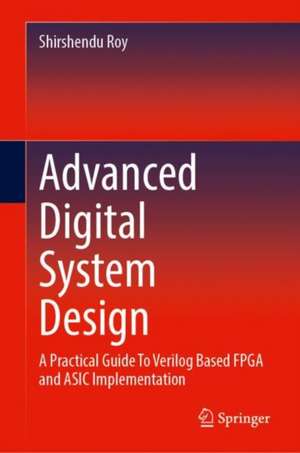Advanced Digital System Design: A Practical Guide to Verilog Based FPGA and ASIC Implementation
Autor Shirshendu Royen Limba Engleză Hardback – 26 sep 2023
Preț: 606.63 lei
Preț vechi: 787.83 lei
-23% Nou
Puncte Express: 910
Preț estimativ în valută:
116.09€ • 119.93$ • 96.62£
116.09€ • 119.93$ • 96.62£
Carte tipărită la comandă
Livrare economică 21-27 martie
Preluare comenzi: 021 569.72.76
Specificații
ISBN-13: 9783031410840
ISBN-10: 303141084X
Pagini: 451
Ilustrații: XXVII, 451 p. 373 illus., 13 illus. in color.
Dimensiuni: 155 x 235 mm
Greutate: 0.93 kg
Ediția:2024
Editura: Springer International Publishing
Colecția Springer
Locul publicării:Cham, Switzerland
ISBN-10: 303141084X
Pagini: 451
Ilustrații: XXVII, 451 p. 373 illus., 13 illus. in color.
Dimensiuni: 155 x 235 mm
Greutate: 0.93 kg
Ediția:2024
Editura: Springer International Publishing
Colecția Springer
Locul publicării:Cham, Switzerland
Cuprins
Binary Number System.- Basics of Verilog HDL.- Basic Combinational Circuits.- Basic Sequential Circuits.- Memory Design.- Finite State Machines.- Design of Adder Circuits.- Design of Multiplier Circuits.- Division and Modulous Operation.- Square Root and its Reciprocal.- CORDIC Algorithm.- Floating Point Architectures.- Timing Analysis.- Digital System Implementation.- Low Power Digital System Design.- Digital System Design Examples.
Notă biografică
Dr. Shirshendu Roy has completed Bachelor of Engineering (B. E.) degree in Electronics and Tele-Communication Engineering in 2010 and Master of Engineering (M. E.) in Digital Systems and Instrumentation in 2016 from Indian Institute of Engineering Science and Technology (IIEST), Shibpur, Howrah, India. He has four years of valuable industrial experience as Control and Instrumentation engineer at MAHAN Captive Power Plant for Hindalco Industries Limited (Aditya Birla Group). He has completed PhD degree from National Institute of Technology (NIT), Rourkela, Odisha, India in VLSI signal processing. Previously he worked in Gandhi Institute of GIET University, Odisha as assistant professor. Currently he is working in Dayananda Sagar University, Bengaluru as assistant professor.
He has published many international journals with the publishing houses like IEEE and IET. He has also authored and published many tutorials on the on-line platform in the field of Digital System Design. His current research interest includes compressed sensing, FPGA based implementation of algorithms (signal, image or video processing algorithms, machine learning algorithms, artificial neural networks etc.), low-power architecture design, ASIC, application of FPGA for IoT applications.
He has published many international journals with the publishing houses like IEEE and IET. He has also authored and published many tutorials on the on-line platform in the field of Digital System Design. His current research interest includes compressed sensing, FPGA based implementation of algorithms (signal, image or video processing algorithms, machine learning algorithms, artificial neural networks etc.), low-power architecture design, ASIC, application of FPGA for IoT applications.
Textul de pe ultima copertă
The book is designed to serve as a textbook for courses offered to undergraduate and graduate students enrolled in electrical, electronics, and communication engineering. The objective of this book is to help the readers to understand the concepts of digital system design as well as to motivate the students to pursue research in this field. Verilog Hardware Description Language (HDL) is preferred in this book to realize digital architectures. Concepts of Verilog HDL are discussed in a separate chapter and many Verilog codes are given in this book for better understanding. Concepts of system Verilog to realize digital hardware are also discussed in a separate chapter. The book covers basic topics of digital logic design like binary number systems, combinational circuit design, sequential circuit design, and finite state machine (FSM) design. The book also covers some advanced topics on digital arithmetic like design of high-speed adders, multipliers, dividers, square root circuits, and CORDIC block. The readers can learn about FPGA and ASIC implementation steps and issues that arise at the time of implementation. One chapter of the book is dedicated to study the low-power design techniques and another to discuss the concepts of static time analysis (STA) of a digital system. Design and implementation of many digital systems are discussed in detail in a separate chapter. In the last chapter, basics of some advanced FPGA design techniques like partial re-configuration and system on chip (SoC) implementation are discussed. These designs can help the readers to design their architecture. This book can be very helpful to both undergraduate and postgraduate students and researchers.
Caracteristici
Presents the basics of digital logic design like binary number systems, combinational circuit design, and FSM Covers Verilog and System Verilog for realizing digital hardware Includes advanced topics like partial reconfiguration and system on chip (SoC) implementation
